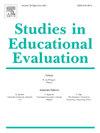Peer and instructor feedback on pre-service EFL teachers’ reflection types and levels in video-mediated microteaching
IF 2.6
2区 教育学
Q1 EDUCATION & EDUCATIONAL RESEARCH
引用次数: 0
Abstract
This study explored the role of peer and instructor feedback on pre-service EFL teachers’ reflection types and levels during a video-mediated microteaching process. While previous research has examined various aspects of reflection and feedback in teacher education, there is currently a lack of studies specifically investigating how instructor and peer feedback shape the types and levels of reflection pre-service teachers engage in through video-mediated microteaching in the EFL context. The participants included 34 third-grade pre-service EFL teachers who performed weekly microteaching sessions. Data collected via qualitative tools were analysed through thematic analysis. Participants initially lacked critical engagement in reflection, focusing primarily on content delivery. However, they became more evaluative in their reflections by engaging in process and premise reflections, particularly in the post-video phase, as a result of listening to recorded teacher and peer feedback and engaging in group discussions. The findings suggest that while microteaching alone was insufficient for fostering deep reflection, the combination of video recordings and constructive peer and instructor feedback guided pre-service teachers towards higher levels of reflection, such as analytical and critical/evaluative reflection. The study highlights the importance of structured feedback opportunities in teacher education programs to cultivate habits of ongoing professional growth among pre-service teachers.
视频微教学中职前英语教师反思类型和水平的同伴和讲师反馈
本研究探讨了同伴和导师反馈对职前英语教师在视频微教学过程中的反思类型和水平的影响。虽然以前的研究已经考察了教师教育中反思和反馈的各个方面,但目前缺乏专门研究讲师和同伴反馈如何影响职前教师在英语背景下通过视频媒介微教学进行反思的类型和水平。参与者包括34名三年级职前英语教师,他们每周进行一次微教学。通过定性工具收集的数据通过专题分析进行分析。参与者最初缺乏批判性的反思,主要关注内容交付。然而,通过参与过程和前提反思,特别是在视频后阶段,由于听了录制的老师和同伴的反馈以及参与小组讨论,他们在反思中变得更具评价性。研究结果表明,虽然单独的微格教学不足以促进深刻的反思,但录像和建设性的同伴和讲师反馈的结合可以指导职前教师进行更高水平的反思,例如分析性和批判性/评价性反思。该研究强调了结构化反馈机会在教师教育项目中培养职前教师持续专业成长习惯的重要性。
本文章由计算机程序翻译,如有差异,请以英文原文为准。
求助全文
约1分钟内获得全文
求助全文
来源期刊

Studies in Educational Evaluation
Multiple-
CiteScore
6.90
自引率
6.50%
发文量
90
审稿时长
62 days
期刊介绍:
Studies in Educational Evaluation publishes original reports of evaluation studies. Four types of articles are published by the journal: (a) Empirical evaluation studies representing evaluation practice in educational systems around the world; (b) Theoretical reflections and empirical studies related to issues involved in the evaluation of educational programs, educational institutions, educational personnel and student assessment; (c) Articles summarizing the state-of-the-art concerning specific topics in evaluation in general or in a particular country or group of countries; (d) Book reviews and brief abstracts of evaluation studies.
 求助内容:
求助内容: 应助结果提醒方式:
应助结果提醒方式:


